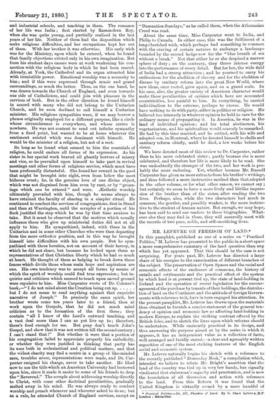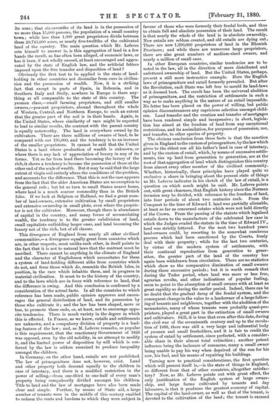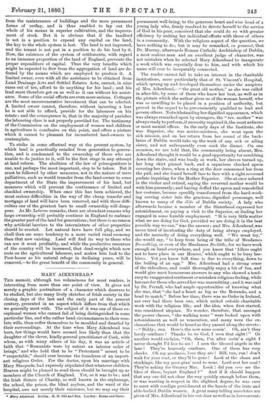MR. LEFEVRE ON FREEDOM OF LAND.*
IN this pamphlet published, as one of a series on "Practical Politics," M. Lefevre has presented to the public in a short space- a more comprehensive summary of the laud question than any which has yet appeared. That this should be the case is not surprising. For years past, Mr. Lefevre has directed a large share of his energies to the examination of different branches of the subject. The preservation of Open Spaces and the social and economic effects of the enclosure of commons, the history of entails and settlements and the practical effect of the system by which land is at present tied up, the state of land-holding in Ireland and the operation of recent legislation for the encour- agement of the purchase by tenants of their holdings, the distribu- tion of land on the Continent and the attitude of foreign Govern- ments with reference to it, have in turn engaged his attention. In the present pamphlet, Mr. Lefevre has drawn upon the materials thus obtained to furnish a concise statement of the general ten- dency of opinion and economic law as affecting land-holding in modern Europe, to explain the striking contrast offered by the British Isles, and to sketch the lines upon which reforms should_ be undertaken. While eminently practical in its design, and thus answering the purpose aimed at by the series in which it appears, it has an independent value as a collection of facts,. well arranged and lucidly stated,—a clear and agreeably written exposition of one of the most striking features of the English social and economic system.
Mr. Lefevre naturally begins his sketch with a reference to- the recently published "Domesday Book," a compilation which, intended we believe to refute Mr. Bright's assertion that the land of the country was tied up in very few hands, has signally vindicated that statesman's sagacity and penetration, and is now the foundation of all discussion and action with reference to the land. From this Return it was found that the United Kingdom is virtually owned by a mere handful of • Practical Potitics.—No, III., Freedom of Land. By G. Shaw Leen a, M.P. London : Macmillan.
its sons ; that six-sevenths of its land is in the possession of no more than 15,000 persons, the population of a small country town ; while less than 1,000 great proprietors divide between them 29,743,000 acres, or nearly five-twelfths of the cultivated
land of the cc4untry. The main question which Mr. Lefevre sets himself to answer is, is this aggregation of land in a few
hands the result, as has often been alleged, of economic laws, or has it been, if not wholly caused, at least encouraged and aggra- vated by the state of English law, and the artificial fetters imposed upon the free transfer and disposition of land ?
Obviously the first test to be applied is the state of land- holding in other countries not dissimilar from ours in civilisa- tion and the possession of wealth. Now, it is a striking fact that except in parts of Spain, in Bohemia, and in Southern Italy and Sicily, nowhere in Europe is there any- thing at all comparable to the state of this country. The yeomen class,—small farming proprietors, and still smaller owners,—peasant proprietors, abound throughout the whole of Western, Central, and Northern Europe, to such an extent that the greater part of the soil is in their hands. Again, in the United States, where similarity of race might be expected to lead to similar results, the contrast with the parent country is equally noteworthy. The land is everywhere owned by its cultivators. There are three millions of owners of land, to be compared with our 195,000, and the tendency is to an increase of the smaller proprietors. It cannot be said that the United States is a land where production of wealth is unknown, or where there is any lack of appreciation of luxury in any of its forma. Yet so far from land there becoming the luxury of the rich, it shows a tendency to become the possession of those at the other end of the scale of wealth. But it may be said that the large extent of virgin soil entirely alters the conditions of the problem, and accounts for the difference. That this is not the case appears from the fact that the older American States are no exception to the general rule ; but let us turn to small States nearer home, where land is a much scarcer commodity than in the British Isles. If we look at Belgium or Holland, we find a great num- ber of land-owners, extensive cultivation by small proprietors and extensive ownership in small plots, even where the proprie- tor is not the cultivator. Moreover, though there is abundance of capital in the country, and many forms of accumulating wealth, the tendency is to the greater subdivision of land, small capitalists outbidding larger ones, and land becoming the luxury not of the rich, but of all classes.
This divergence of England from nearly all other civilised ,communities,— a divergence equally great from countries which
are, in other respects, most unlike each other, in itself points to the fact that it is not to natural laws that the contrast must be ascribed. There cannot be anything in the climate of England and the character of Englishmen which necessitates for them a system of land-holding different alike from countries which do not, and from those which do, resemble the British Isles, in position, in the race which inhabits them, and in progress in material civilisation. It must be to the history of the country, and to the laws which are in force with reference to land, that the difference is owing. And this conclusion is confirmed by a consideration of the actual facts. In all the countries to which reference has been made, public opinion approves and encou- rages the general distribution of land, and its possession by those who cultivate it; and the law has been shaped, more or less, to promote these ends, or, at least, not to encourage oppo- site tendencies. There is much variety in the degree in which this is effected. In France, as we know, entails and settlements are unknown, and a compulsory division of property is a lead- ing feature of the law; and, as M. Lefevre remarks, so popular is this requirement, that the reactionary Government of 1826 was opposed, even by the old nobility, in an attempt to modify it, and the limited power of disposition by will which is con- ferred by the law is seldom exercised to produce inequality amongst the children.
In Germany, on the other hand, entails are not prohibited. The law of primogeniture does not, however, exist. Land and other property both descend equally to the children in case of intestacy, and there is a modified restriction in the power of selling,—from one-third to one-half of every man's property being compulsorily divided amongst his children. 'Title to land and the law of mortgages have also been made clear and simple. Further, by means of State aid, a large number of tenants were in the middle of this century enabled to redeem the rents and burdens to which they were subject in favour of those who were formerly their feudal lords, and thus to obtain full and absolute possession of their land. The result is that nearly the whole of the land is in absolute ownership.
New entails are seldom created, and old entails are dying out. There are now 1,300,000 proprietors of laud in the Rhenish Provinces ; and while there are numerous large proprietors, there are also great numbers of medium-sized owners, and nearly a million of small ones.
In other European countries, similar tendencies are to be noted in the law, all in the direction of more distributed and
unfettered ownership of land. But the -United States, perhaps,
present a still more instructive example. Here the English laws of primogeniture and entail formerly prevailed. But after the Revolution, each State was left free to mould its land-laws as it deemed best. The result has been the universal abolition of primogeniture, and the restriction of settlements in such a way as to make anything in the nature of an entail impossible.
No fetter has been placed on the power of willing, but public opinion discountenances any capricious selection amongst child- ren. Land transfer and the creation and transfer of mortgages have been rendered simple and inexpensive ; in short, legisla- tion has aimed at the freedom of land from any exceptional restrictions, and its assimilation, for purposes of possession, use, and transfer, to other species of property.
The obvious conclusion from these facts is that the sanction given in England to the custom of primogeniture, by the law which gives to the eldest son all his father's land in case of intestacy, and by the custom of entail, which, by means of successive settle- ments, ties up land from generation to generation, are at the root of that aggregation of land which distinguishes this country from almost every other member of the civilised community. Whether, historically, these principles have played quite so exclusive a share in bringing about the present state of things as Mr. Lefevre indicates in his sketch of the law of entail, is a question on which much might be said. Mr. Lefevre points out, with great clearness, that English history since the Norman invasion may be divided, with reference to the freedom of land, into four periods of about two centuries each. From the Conquest to the time of Edward I. land was partially alienable, at least so far as concerned estates which were not held directly of the Crown. From the passing of the statute which legalised entails down to the manufacture of the celebrated law case in which the Judges evaded the statute in the time of Edward IV., land was strictly fettered. For the next two hundred years land-owners could, by resorting to the somewhat cumbrous process which had been sanctioned by the Courts, freely deal with their property ; while for the last two centuries, by virtue of the modern system of settlements, with their continual reproduction from generation to gener- ation, the greater part of the land of the country has again been withdrawn from circulation. There are no statistics which show us the comparative diminution of small owners during these successive periods ; but it is worth remark that during the Tudor period, when land was more or less free, agrarian revolts, and other indications of popular feeling, seem to point to the absorption of small owners with at least as great rapidity as during the earlier period. Indeed, there can be no doubt that the gradual decay of the feudal system, and the consequent change in the value to a landowner of a large follow- ing of tenants and neighbours, together with the abolition of the monasteries, many of whose tenants were probably quasi-pro- prietors, played a great part in the extinction of small owners and cultivators. Still, it is true that even after this date, during the civil war of the seventeenth century and up to the revolu- tion of 1688, there was still a very large and influential body of yeomen and small freeholders, and it is fair to credit the system of entail by settlement, since perfected, with a consider- able share in their almost total extinction ; another potent influence being the inclosure of commons, many a small owner being unable to pay his way when deprived of the run for his cow, his fuel, and his means of repairing his buildings.
Turning now to practical considerations, the first question which will present itself is,—is the state of things in England, so different from that of other countries, altogether satisfac- tory? Now, as Mr. Lefevre points out with great effect, the only justification of the English system of large owner- ship, and large farms cultivated by tenants and day labourers, is that it produces the greatest economy of capital. The capital of the land-owner, as well as that of the tenant, is devoted to the cultivation of the land ; the tenant is excused
from the maintenance of buildings and the more permanent forms of outlay, and is thus enabled to lay out the whole of his means in superior cultivation, and the improve- ment of stock. But it is obvious that if the landlord is not in a position to expend any capital on the land, the key to the whole system is lost. The land is not improved, and the tenant is not put in a position to do his best by it. Now, the existence of the system of settlements, with regard to an immense proportion of the land of England, prevents the proper expenditure of capital. Thus the very benefits which might be expected to flow from the aggregation of land are de- feated by the means which are employed to produce it. A limited owner, even with all the assistance to be obtained from Land Drainage Acts and Settled Estates Acts, cannot, in nine cases out of ten, afford to do anything for his land ; and his land must therefore get on as well as it can without his assist- ance. Some of the social effects are even more serious. Cottages are the most unremunerative investment that can be selected. A limited owner cannot, therefore, without incurring a loss he is not able to afford, provide for the labourers on his estate ; and the consequence is, that in the majority of parishes the labouring class is not properly provided for. The testimony of the Commission on the employment of women and children in agriculture is conclusive on this point, and offers a picture which it cannot be pleasant for incumbered land-owners to contemplate.
To strike in some effectual way at the present system, by which land is practically entailed from generation to genera- tion, and. is condemned to the ownership of those who are unable to do justice to it, will be the first stage in any attempt at land reform. The abolition of the law of primogeniture is one, and perhaps the most important, step to be taken. But it must be followed by other measures, not in the nature of mere palliatives, such as would transfer from the land-owner to some department of the State the improvement of his land, but measures which will prevent the continuance of limited and shackled ownership. When once this has been achieved, the most serious difficulties in the way of the cheap transfer and mortgage of land will have been removed, and with these diffi- culties one of the greatest bars to small ownership will disap- pear. As Mr. Lefevre remarks, there are abundant reasons why large ownership will probably continue in England to embrace the greater part of the land for generations ; but there is no reason why artificial barriers to the intermixture of other properties should be erected. Let natural laws have full play, and we shall then see some tendency to a more varied rural economy than that now existing. Land will find its way to those who can use it most profitably, and while the productive resources of the country will be increased, that dead-weight which now rests on the agricultural labourer, and makes him look to the Poor-house as his natural refuge in declining years, will be removed,—to the great benefit of the community in general.




































 Previous page
Previous page